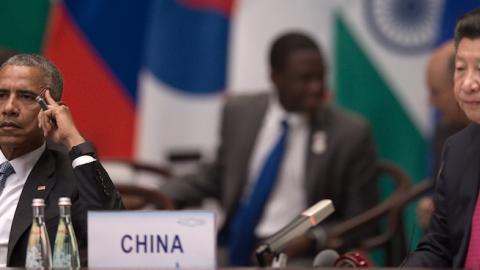The G-20 summit has concluded, as usual, not with a bang, but a whimper. The WSJ:
China rallied the Group of 20 around a call to use new levers to revive global growth, but the group’s nine-page statement was short on concrete steps and on signs that Beijing would lead by example.
Chinese President Xi Jinping said leaders would put guidelines on global investment in place and explore structural overhauls, acknowledging the need for measures beyond low interest rates to prop up the global economy amid growing resentment of globalization’s effects.
Leaders from U.S. President Barack Obama and British Prime Minister Theresa May to Mr. Xi highlighted in news conferences and meetings the need to improve the lives of ordinary citizens to garner support for increasingly unpopular trade deals. “There must be more growth and growth must be more inclusive,” the International Monetary Fund’sChristine Lagarde said at the meeting’s conclusion.
There was great hullaballoo back in the fresh and hopeful days of the Obama Administration. The G-20 was going to be a major reform of world economic governance. It was going to create a more representative, and therefore more important, international political forum—a place where countries like Brazil and India at last would have their day in the sun and have aF real impact on global policy.
Well, it's not exactly worked out like that. Those who hyped the G-20 don’t understand what economic power is, or how it works. Meetings of heads of governments rarely if ever produce anything substantial in the way of economic policy changes. Not one central bank anywhere in the world is going to change interest rates, not one government is going to raise or cut spending, and no serious economic decisions or policies will be changed in any significant way as a result of this global gab fest. Like the G-7 and the G-8 meetings before the G-20, these events are mostly a photo op—a chance for politicians in office to strut on the world stage and hope that the folks back home pay attention.
Looking back, it seems fairly clear that the major achievement of the Obama Administration in global economic governance was to disempower countries like India and Brazil, and to reduce their impact on global decision making. The reason? By shifting the momentum of global trade talks away from the moribund Doha Round in the World Trade Organization, and focusing on regional talks that include most of the world’s major economic powers, the Obama Administration gutted India’s and Brazil’s trade strategies—which mainly involved throwing up road blocks at the WTO unless their demands were met.
And now Obama's strategy, in turn, appears to be running into the ground—not because India and Brazil have been able to do anything about the shift, but because both the Asian regional trade agreement, and the European agreement, are getting bogged down in politics. Partly because trade deals are negotiated in ways that can reinforce the power of major economic actors rather than subjecting them to greater competition, and partly because populists are getting a better hearing when they attack free trade as the root of all evil (in other countries as well as in the United States), both of the big trade negotiations of the Obama years are in trouble.
This is not to say that summits such as the G-20 have no value; but like a lot of conferences, the value is in the networking and side conversations; the formal program is largely a waste of time. As we’ve said before, the first thing anybody needs to do who wants to follow the news intelligently is to learn to filter out the noise in order to focus on the signal. The G-20 is noise; what goes on there has little or nothing to do with the real events shaking the earth.
















